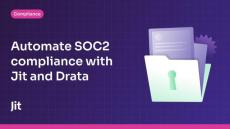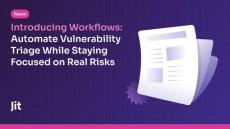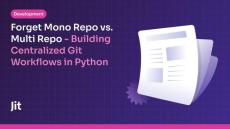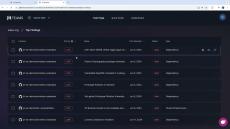|
By Jit
Checking off application security requirements for SOC 2 compliance is often a burden for everyone involved. Security and GRC teams need to manually upload evidence to SOC2 compliance systems like Drata, while development teams suddenly need to use code security scanners that throw wrenches in the SDLC.
|
By Charlie Klein
Security teams and developers are drowning in product security alerts. Every security scan generates a flood of issues, and manually reviewing, prioritizing, and assigning each one is time-consuming and inefficient. The result? Critical risks get buried in long backlogs, while developers waste time chasing issues that don’t actually introduce real risk.
|
By Charlie Klein
Today, Jit and Cyera are thrilled to announce an integration that will help address one of the most pressing challenges in cybersecurity: prioritizing code and cloud vulnerabilities according to the actual risk they introduce. Put simply, this integration will make it easy for security teams to pinpoint vulnerabilities (detected by Jit) that impact the security of your most sensitive data (monitored by Cyera). As a result, security teams.
|
By Charlie Klein
At Jit, we’re all about empowering developers to build secure software without compromising agility. But as teams scale, enforcing strong governance and compliance practices while enabling flexibility can be tricky. That’s why we’re thrilled to announce Policies, a new feature that lets you customize controls over who can ignore security findings in Jit. With Policies, you can ensure security findings are addressed appropriately based on risk, context, and compliance requirements.
|
By Jit
Modern software applications operate within increasingly complex ecosystems, spanning multiple layers of the stack—from the user interface and application logic to APIs, databases, and third-party dependencies. Each layer introduces unique vulnerabilities, often requiring specialized domain expertise to identify and mitigate.
|
By Aviram Shmueli
At Jit, we are proud to announce our participation in a consortium of companies that have come together to launch Opengrep, a continuation of Semgrep’s groundbreaking OSS. Opengrep is born out of our shared commitment to keeping static code analysis open, accessible, and community-driven.
|
By Shlomi Kushchi
Are you concerned about the security of your AWS environment? With over 73% of businesses having at least one critical security misconfiguration, it's essential to take proactive measures to protect your data and applications. While AWS is responsible for the security of the underlying infrastructure, you are responsible for securing your data and applications in the cloud.
|
By David Melamed
This blog article summarizes a talk given by David Melamed, Jit CTO, at Pycon DE & PyData 2022 in Berlin. In every software development project, before even writing the first line of code, you gotta pick an architecture for your repo. Picking an architecture is not easy. There are many tradeoffs that need to be considered and this choice will impact future development.
|
By Charlie Klein
The success of any application or cloud security initiative depends on developer buy-in, so they can fix vulnerabilities before arriving in production. So why can it be challenging to empower developers to secure their code early? The answer is simple: security is usually slow. Developers are motivated to deliver innovative features faster than their competitors, so introducing new processes into the CI/CD pipeline that slow them down could understandably be met with resistance.
|
By The Jit Team
On February 15th, our friends at Semgrep hosted a meet up for the OWASP community at their beautiful office in San Francisco. Application security professionals and developers in the San Francisco tech community showed up to discuss what has been working for them, what isn’t working, and upcoming trends in the world of application security. In this short recap, we’ll explore some of the topics discussed by Semgrep’s Kyle Kelly and our very own Aviram Shmueli.
|
By Jit
With Jit Workflows, you can set up automations that create alerts for newly detected code and cloud security issues and delegate them to the relevant team.
|
By Jit
Use contextual prioritization to focuses on the real risks, while weeding out the noise.
|
By Jit
Learn how Jit Teams provides a dedicated security portal for every development team, so they can have full visibility into the security of their services and understand where to focus remediation efforts.
|
By Jit
In five minutes, explore Jit's core product capabilities to empower developers to secure everything they code and unify product security risk mitigation.
|
By Jit
Amir Kessler provides his perspective on prioritizing vulnerabilities based on their runtime and business context.
|
By Jit
Chris provides his perspective on Jit's approach to unifying leading open source product security scanners in one place to consolidate scanning, prioritization, and remediation.
|
By Jit
Amir Kessler gives his perspective on one of the fundamental challenges of AppSec – making sense of huge volumes of product security issues – and how ASPM can solve this problem.
|
By Jit
Chris Hughes describes the advantages of product security orchestration, which enables security teams to plug their favorite scanners into a single framework that unifies the execution and UX of multiple tools.
|
By Jit
Learn how to integrate Jit with GitHub to start scanning your codebase for security vulnerabilities, while implementing continuous scanning for newly introduced vulnerabilities.
|
By Jit
Learn how Clasp unified static analysis, open source license checking, DAST, IaC scanning, and more with Jit.
- February 2025 (4)
- January 2025 (3)
- December 2024 (4)
- November 2024 (12)
- October 2024 (6)
- September 2024 (3)
- July 2024 (3)
- June 2024 (8)
- May 2024 (13)
- April 2024 (21)
- March 2024 (11)
- February 2024 (9)
- October 2023 (3)
- September 2023 (3)
- August 2023 (1)
- June 2023 (3)
- May 2023 (2)
- March 2023 (1)
- February 2023 (2)
Jit is the easiest way to secure your code and cloud, providing full application and cloud security coverage in minutes. Tailor a developer security toolchain to your use case and implement it across your repos in a few clicks.
Jit empowers developers to own the security of their code without ever leaving their workflow, prioritizing the alerts that matter. Using your current security toolset with Jit, your devs can deliver secure code faster than ever.
Full Security Coverage in Minutes:
- Iterative scanning within the PR makes Jit easy to adopt for developers: Fast and automated scanning within GitHub make security checks feel like quality checks, so developers can easily incorporate Jit into their day-to-day.
- Gamified security tracking per team: Every team can monitor their security score, which is based on open vulnerabilities in their repos.
- Leverage an open and extensible orchestration framework: Easily plug any tool into Jit’s extensible orchestration framework to unify the execution and interface of any security tool, enabling a more consistent DevSecOps experience.
The easiest way to secure your code and cloud.





















